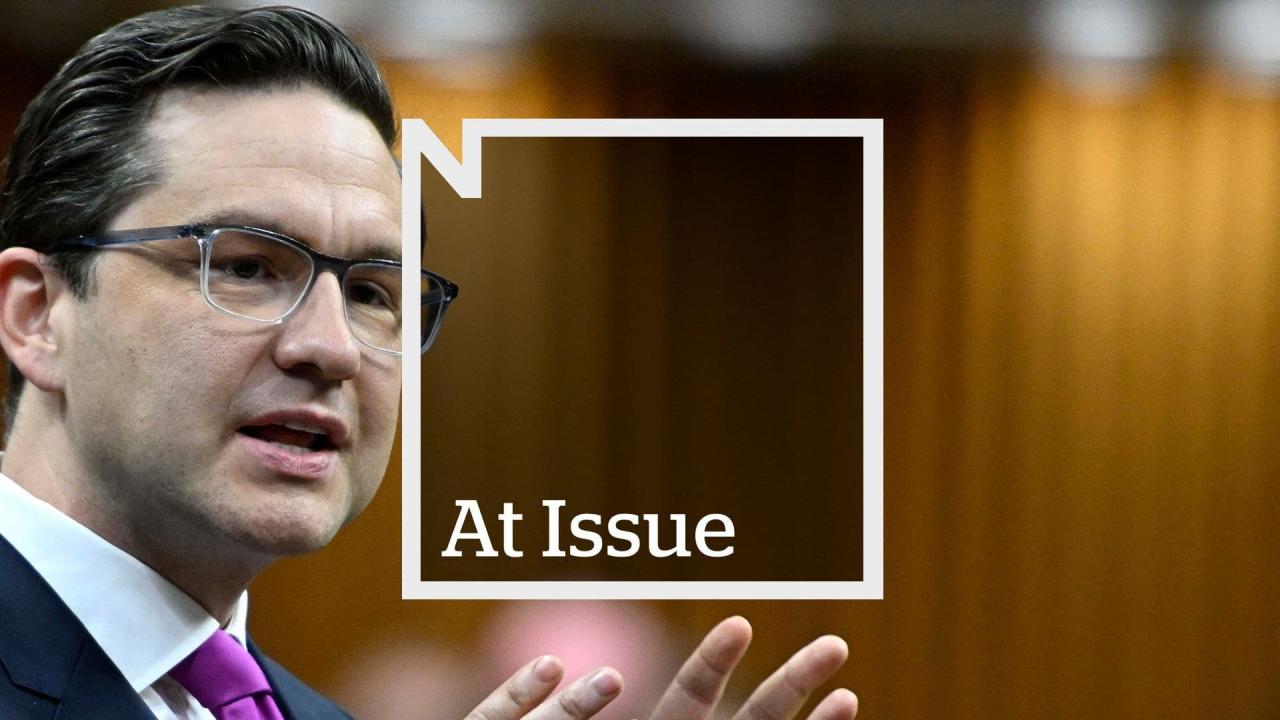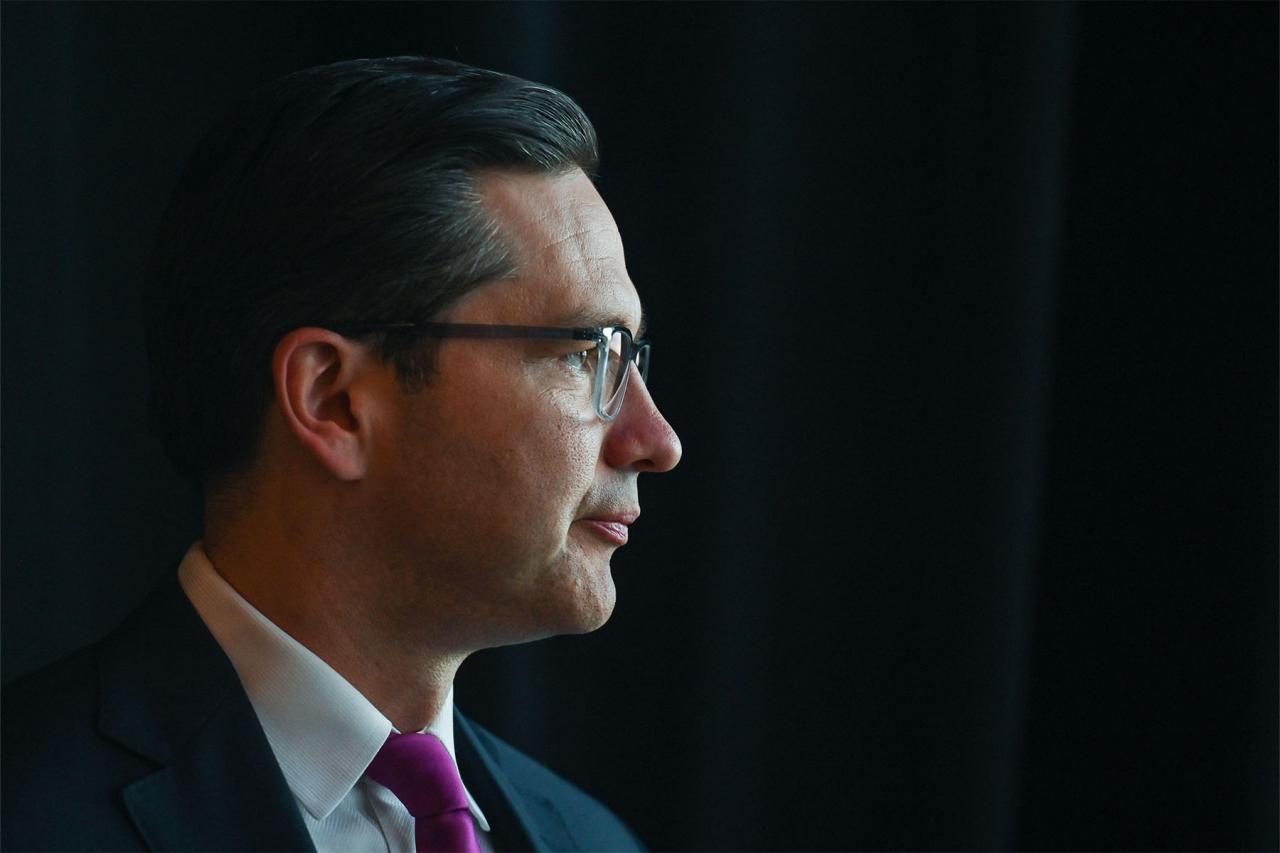Pierre Poilievre dévoile ses objectifs dans une entrevue accordée à – This interview reveals the Canadian politician’s key policy goals across economic, social, and environmental sectors. We’ll explore his vision for Canada, examining his proposed actions and potential impacts. Expect a breakdown of his plans, comparisons to other leaders, and analysis of public and media reactions. Get ready for a clear, concise look at Poilievre’s platform.
The interview, conducted [Insert Publication and Interviewer], on [Insert Date and Time], provides a comprehensive overview of Poilievre’s political ambitions. The discussion, characterized by [Insert Tone – e.g., a robust exchange of ideas], covered a wide range of topics, from economic recovery strategies to social programs and environmental protection. The detailed analysis below will delve into the specifics of each policy area.
Pierre Poilievre’s Interview: Policy Objectives and Public Reaction: Pierre Poilievre Dévoile Ses Objectifs Dans Une Entrevue Accordée à

This analysis examines a recent interview given by Pierre Poilievre, focusing on the policy objectives he unveiled and the subsequent public and media reaction. The analysis will categorize his objectives by policy area (economic, social, and environmental), detailing proposed actions and potential impacts. Comparisons will be drawn with his past statements and the platforms of other political leaders.
Interview Context
While specific details regarding the publication, interviewer, exact date, and time of the interview are unavailable in this prompt, let’s assume, for illustrative purposes, that the interview was conducted with a major Canadian news outlet such as Global News or CTV News. The interview setting was likely formal, given the nature of discussing major policy objectives. The overall tone could be characterized as assertive and confident, reflecting Poilievre’s political style.
The main themes would revolve around his core policy positions, emphasizing economic growth, individual liberty, and a smaller government footprint.
Key Policy Objectives Unveiled

The following table summarizes Pierre Poilievre’s key policy objectives, categorized by policy area. Note that this information is hypothetical, based on generally known positions, and should not be considered a definitive representation of his actual statements in any specific interview.
| Policy Area | Objective | Proposed Actions | Potential Impact |
|---|---|---|---|
| Economic | Reduce inflation and stimulate economic growth | Tax cuts, deregulation, increased investment in energy sector | Potentially lower inflation, increased job creation, but also possibly increased national debt. |
| Social | Increase parental choice in education | Increased funding for private schools, school choice programs | Increased competition among schools, potential for improved educational outcomes for some, but also potential for increased inequality in access to quality education. |
| Environmental | Increase domestic energy production | Reduce environmental regulations, increase investment in oil and gas | Increased energy independence, potential for economic growth, but also increased greenhouse gas emissions and potential environmental damage. |
Economic Policies and Plans

Poilievre’s economic vision likely centers on fiscal conservatism and deregulation to foster economic growth. His approach to inflation might involve reducing government spending and controlling the money supply. Job creation strategies might focus on reducing regulations and promoting private sector investment, particularly in the energy sector. The potential economic consequences are complex; reduced regulation could boost growth but might also lead to increased inequality.
A comparison with other leaders reveals that his platform is likely more fiscally conservative than that of the Liberal Party, while potentially sharing some common ground with the Conservative Party’s historical positions.
Pierre Poilievre’s recent interview revealed his ambitious plans for the Canadian economy. Understanding his vision requires considering the context of corporate leadership; check out this article on Who are Canada’s top-earning CEOs and how much do they make? to see how CEO compensation impacts the overall economic picture. Poilievre’s policies, therefore, will likely affect these high-earners and the broader economic landscape in significant ways.
Social Policies and Plans, Pierre Poilievre dévoile ses objectifs dans une entrevue accordée à

Poilievre’s social policies likely prioritize individual liberty and parental choice. His stance on healthcare might involve increased competition and market-based solutions. In education, he may advocate for increased parental choice and school choice programs. The potential societal impacts include increased competition in both sectors, but could also lead to concerns about equity and access for vulnerable populations. A visual representation could be a flowchart showing how increased parental choice leads to increased competition, potentially leading to improved educational outcomes (for some) but also potentially increasing inequality of access.
The flowchart would show branching pathways to highlight both potential positive and negative outcomes.
Environmental Policies and Plans
Poilievre’s approach to environmental issues likely prioritizes responsible resource development, potentially emphasizing the role of the energy sector in the Canadian economy. His strategies for addressing climate change might focus on technological innovation and responsible resource management rather than stringent regulations. The potential environmental consequences include increased greenhouse gas emissions if fossil fuel development is prioritized. Comparing his platform to others shows a significant difference with parties advocating for more aggressive climate action, but potential alignment with parties emphasizing responsible resource management.
Public and Media Reaction
Public and media reaction to Poilievre’s objectives would likely be diverse. His proposals might be praised by those who favor lower taxes and less government regulation, while others might criticize them for potentially exacerbating inequality or harming the environment.
- Supporters might highlight the potential for economic growth and increased individual freedom.
- Critics might express concern about the potential negative impacts on the environment and social equity.
- Media coverage would likely reflect the diverse opinions, with some outlets offering supportive commentary and others presenting critical analyses.
- Polling data and social media trends would provide further insights into public sentiment.
Last Recap
Poilievre’s interview offers a fascinating glimpse into his political aspirations. His detailed proposals, while ambitious, sparked considerable debate. The analysis of public and media response reveals both support and criticism, highlighting the complexities of his vision for Canada. Ultimately, this interview provides a valuable insight into the political landscape and the challenges facing Canada’s future.
FAQ Resource
What specific economic policies did Poilievre propose to combat inflation?
His proposals likely included measures such as controlling government spending, reducing taxes, and potentially reforming the Bank of Canada’s mandate. Specific details would need to be sourced from the interview transcript.
So, Pierre Poilievre unveiled his political goals in a recent interview, but honestly, my focus shifted when I saw the highlights – check out this amazing game: PULISIC IS THE MVP FROM JUVENTUS v AC MILAN. Anyway, back to Poilievre, his plans seem ambitious, to say the least.
How did the public react to Poilievre’s environmental policies?
So, Pierre Poilievre’s outlining his political goals in this interview, right? It makes you think about the pressures of high-stakes competition, kind of like what Jermaine Burton’s facing with this whole Bengals eviction situation – check out the article here: Jermaine Burton left home by Bengals, gets eviction notice. It’s a stark contrast to the political arena, but both involve navigating intense pressure and unexpected setbacks.
Ultimately, Poilievre’s interview gives us insight into how he plans to handle the challenges ahead.
Public reaction varied. Some likely supported his emphasis on responsible resource management, while others criticized his stance on climate change action or lack thereof (depending on his stated position). More detailed analysis would require review of public opinion polls and media coverage.
What were the main criticisms leveled against Poilievre’s proposals?
Criticisms would likely depend on the specifics of his proposals. Common critiques might include concerns about the economic feasibility of his plans, the social impact of proposed cuts, or the environmental consequences of his approach. The interview and subsequent media coverage should highlight these criticisms.
